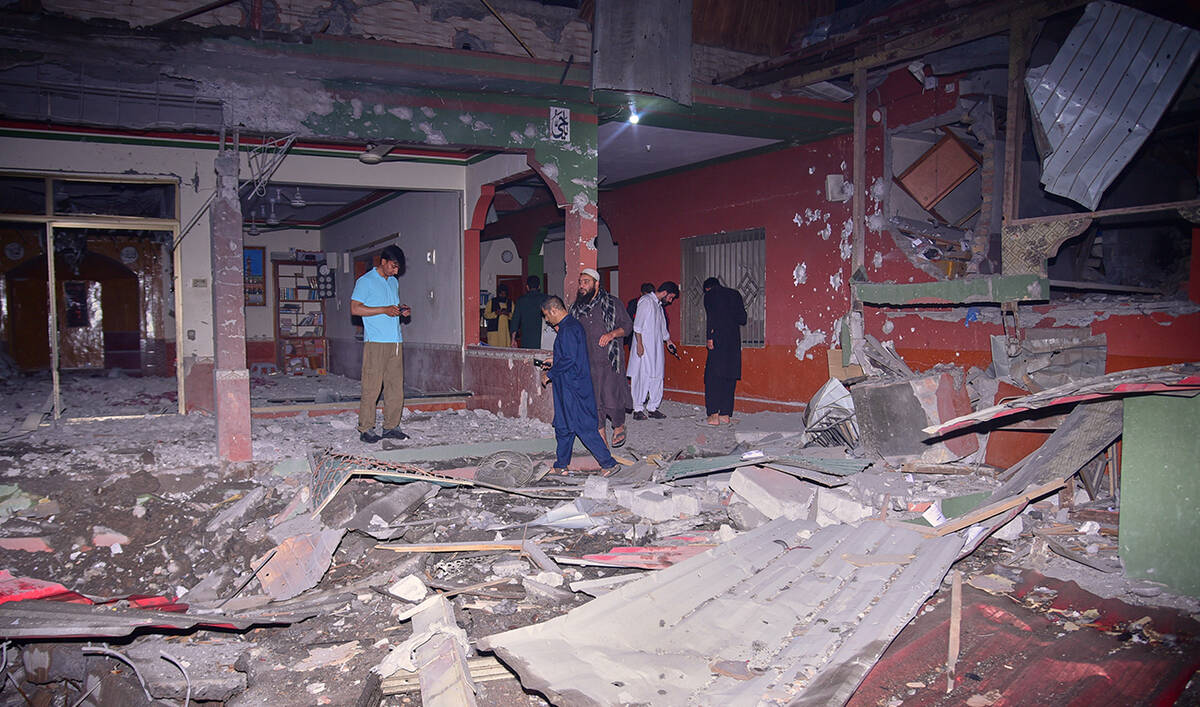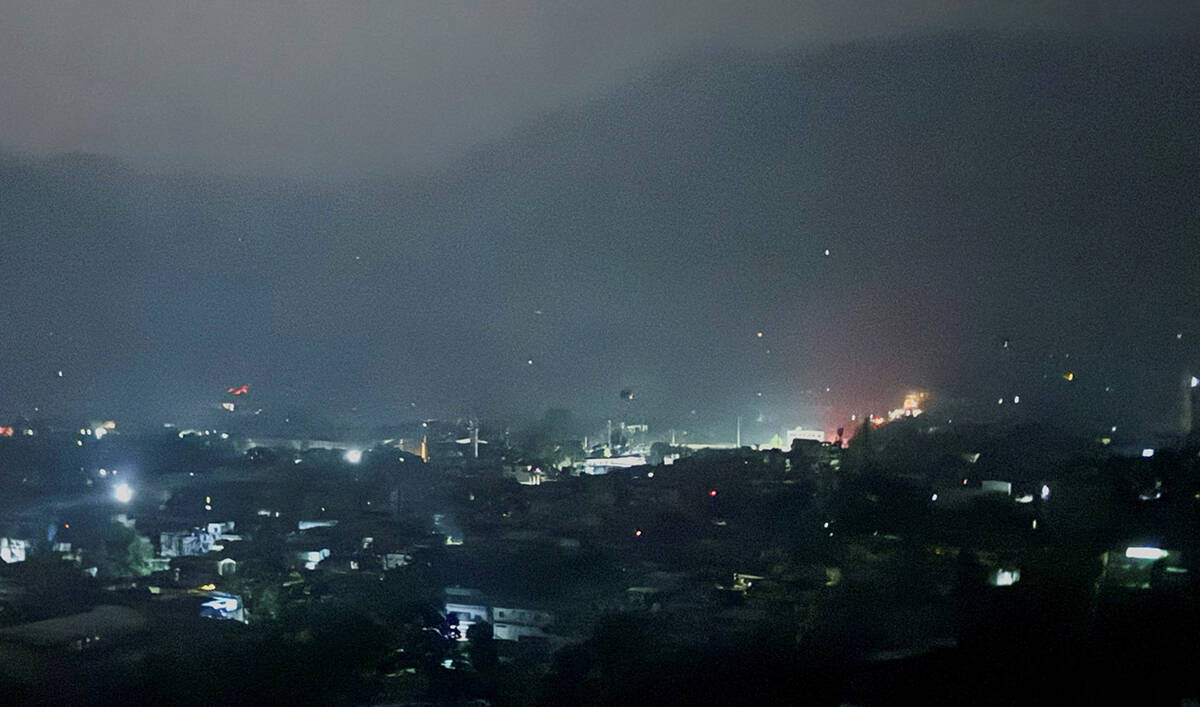ISLAMABAD: Pakistan’s top national security forum on Saturday announced its plan to launch a comprehensive counterterrorism campaign, Operation Azm-e-Istehkam — or Resolve for Stability — after Prime Minister Shehbaz Sharif led a meeting of the civilian and military leadership to review the ongoing security situation in the country.
Pakistan has witnessed a surge in militant attacks since a proscribed armed network, Tehreek-e-Taliban Pakistan (TTP), called off a fragile ceasefire with the government in November 2022. Much of the violence was witnessed in the country’s western provinces of Khyber Pakhtunkhwa and Balochistan, which share a border with Afghanistan where the TTP leaders have reportedly found sanctuary.
While the militants have primarily targeted Pakistani civilians and security forces, they have also threatened the national economy by attacking Chinese nationals working on energy and infrastructure development projects under a multibillion-dollar regional connectivity framework, causing concern in both Beijing and Islamabad.
The Central Apex Committee of the National Action Plan, a high-level forum that includes the army chief, provincial chief ministers and heads of major civil and military law enforcement agencies, convened to discuss the situation before deciding to launch the campaign.
“The Prime Minister approved a reinvigorated and re-energized national counter-terrorism campaign through launching of Operation AZM-E-ISTEHKAM, with consensus of all stakeholders including the Provinces, Gilgit Baltistan and Azad Jammu and Kashmir, symbolizing the national resolve to eradicate extremism and terrorism from the country,” said a statement released after the meeting.
“In the politico-diplomatic domain, efforts will be intensified to curtail the operational space for terrorists through regional cooperation,” it added. “The renewed and full blown kinetic efforts of the armed forces will be augmented by full support from all Law Enforcement Agencies, empowered by effective legislation to address legal voids that hinder effective prosecution of terrorism-related cases and award of exemplary punishments to them.”
The statement said the campaign would also be complemented by socioeconomic measures aimed at addressing the genuine concerns of people and creating an environment that discourages extremist tendencies.
It would also leverage the information space to promote a unified national narrative in support of the efforts to eradicate militancy from the country.
“The forum reiterated that the fight against extremism and terrorism is Pakistan’s war and is absolutely essential for the nation’s survival and well-being,” the statement informed. “The forum resolved that no one will be allowed to challenge the writ of the state without any exception.”
It noted that the apex committee participants also reviewed measures to ensure foolproof security for Chinese nationals in Pakistan.
INVESTOR CONFIDENCE
Earlier, the prime minister emphasized the necessity of developing a strong and comprehensive response to the challenge of militant violence in Pakistan, saying it was not possible for a “soft state” to strengthen its economy since it tends to lose confidence of potential investors.
He made the observation only a day after senior Chinese politician Liu Jianchao said in Islamabad that Pakistan’s security challenges were undermining the confidence of investors from his country.
Liu’s statement reinforced concerns raised by authorities in Beijing following several attacks on Chinese nationals working on energy and infrastructure development projects in Pakistan, including a suicide bombing in March this year that killed five of them.
“For sustainable development in Pakistan, stability and the rule of law are essential,” the prime minister said. “It is our collective responsibility to enforce the writ of the state with full force and without exception.”
“A soft state can never earn the confidence of investors, whether they are domestic or foreign,” he continued. “Therefore, a healthy and strong economy cannot be envisaged in an unstable state plagued by terrorism.”
Sharif maintained fighting militant violence was the joint responsibility of all institutions of the state.
“We have very easily left this matter to the officers and soldiers of our armed forces,” he added. “The provinces and governments have completely absolved themselves of this responsibility. This is the dangerous approach that has developed over the past years.”
He noted this was not the way Pakistan could “end terrorism.”
“After the 18th amendment in the constitution, the provincial governments have a significant role in this effort and have also been provided resources,” he said. “Therefore, I expect that the provinces will play an active part in combating terrorism. Together, God willing, we will eradicate this scourge.”
Sharif said it was important for everyone to take the ownership of the war against militancy, adding that leaving it to just one institution of the state would be a “grave mistake.”
Earlier in the day, Pakistan’s interior minister Mohsin Naqvi also held a meeting to review the security measures for foreign nationals, particularly the Chinese workers in the country.
Pakistan initiates ‘Operation Azm-e-Istehkam’ in national security drive amid escalating militant violence
https://arab.news/w2537
Pakistan initiates ‘Operation Azm-e-Istehkam’ in national security drive amid escalating militant violence

- The counterterrorism drive was announced after PM Sharif warned ‘soft states’ failed to gain investor confidence
- Shehbaz Sharif called it a ‘grave mistake’ only to expect the armed forces to deal with the issue of militant violence
Pakistan says eight killed, 35 injured after India fires missiles at six locations

- Pakistan military says Ahmedpur East, Muridke, Sialkot, Shakargarh, Kotli, Muzaffarabad cities targeted
- India says hit “terrorist infrastructure” at nine sites from where April 22 militant attack against India was “planned”
ISLAMABAD: Pakistan military spokesperson Lieutenant General Ahmed Sharif Chaudhry said on Wednesday eight civilians had been killed and 33 injured as India launched missile attacks at six locations in a sharp escalation of hostility between the two nuclear-armed rivals.
The development comes amid heightened tensions between the longstanding enemies in the aftermath of an attack on tourists in Indian-administered Kashmir last month in which 26 men were killed. India, without providing evidence publicly, has accused Pakistan of involvement in the assault in the hill station of Pahalgam and vowed to respond. Pakistan has denied involvement, and several top officials have spoken since of intelligence that India was planning to launch retaliatory attacks.
Kashmir has been disputed between India and Pakistan since 1947. Both rule it in part and claim it in full and have fought two of their three wars over the Himalayan region. India accuses Pakistan of arming and training militants involved in a separatist insurgency in its part of Kashmir since 1989, which Islamabad denies, saying it offers only moral and diplomatic support to the Kashmiri people in their struggle for self-determination.

“Total of six locations in Pakistan were hit,” Chaudhry said in televised remarks, saying the attacks were carried out using “different weapons.”
“Eight Pakistanis were martyred, 35 are injured and two are missing.”
An Indian government statement said its armed forces had launched "Operation Sindoor," hitting nine sites in Pakistan and Azad Kashmir from where it said the Pahalgam attack of April 22 had been “planned and directed.”
No Pakistani military facilities had been targeted, the statement added.
Detailing the casualties, the Pakistan army spokesman said a 3-year-old child, two men and two women had been killed in Ahmedpur East, a city in the eastern province of Punjab, while 31 people were injured.
One man was killed in Muridke, also in Punjab, while two teenagers had died in Kotli in Azad Kashmir, which is a part of the disputed Himalayan region governed by Pakistan. Other places that were struck were Muzaffarabad, also in Azad Kashmir, and Sialkot and Shakargarh in Punjab, but no casualties were reported there.
“The Pakistan Armed Forces, with the full support of the Pakistani nation, are giving and will continue to give a strong response to this cowardly and unprovoked attack,” Chaudhry said, without giving details on the nature of Pakistan’s retaliation.
Information Minister Attaullah Tarar told BBC Pakistan had shot down three Indian planes while Defense Minister Khawaja Muhammad Asif told Bloomberg TV Pakistan has downed five Indian planes and captured some Indian soldiers also.
The claims could not be independently verified by Arab News.
When asked if he feared a further escalation of the conflict, Tarar told Sky News Pakistan had offered to be part of an investigation into the Pahalgam attack but India had acted as “the aggressor without evidence.”

Pakistan's foreign ministry said while the Indian air force had remained within Indian airspace, it “violated Pakistan's sovereignty using standoff weapons.”
“MAXIMUM RESTRAINT”
Prime Minister Shehbaz Sharif has meanwhile convened a meeting of the National Security Committee at 10am to finalize Pakistan’s response to the Indian actions while the ministry of defense in New Delhi said it would provide a “detailed briefing” on the operation later in the day.
A spokesman for United Nations Secretary-General António Guterres said he was “very concerned” about the Indian military operations and had called for “maximum military restraint” from both countries.
"The world cannot afford a military confrontation between India and Pakistan,” the statement said.
Speaking to reporters at the White House, US President Donald Trump said he had just heard about the intensification of hostilities that had occurred in recent hours.
"It's a shame … I hope it ends very quickly," he said.
After the Pahalgam attack, India and Pakistan unleashed a raft of punitive measures against each other, with Pakistan closing its airspace to Indian airlines, and India suspending the 1960 Indus Waters Treaty that regulates water-sharing from the Indus River and its tributaries.
Diplomatic relations between Pakistan and India were weak even before the latest conflict as Pakistan had expelled India’s envoy and not posted its own ambassador in New Delhi after India revoked the semi-autonomous status of Kashmir in 2019.
The last military confrontation between the rivals occurred in 2019 when India conducted air strikes on what it said was a militant training camp near the northwestern Pakistani town of Balakot in response to a suicide car bombing in Indian-administered Kashmir's Pulwama area.
Pakistan, which said the planes had bombed an empty hillside and not a camp, launched a retaliatory incursion into Indian airspace that led to a dogfight between the two air forces, leading to the capture of an Indian pilot.
The situation cooled after he was released days later.
On Wednesday morning, Indian police said two women had been injured in Indian-administered Kashmir in shelling by Pakistani troops. One of them was in critical condition, they added. There was no comment from the Pakistani military.
In Pakistan, an emergency has been declared in the country’s largest and most populous province of Punjab, the provincial chief minister said, with hospitals and security forces on high alert. Schools will also remain closed on Wednesday.
A spokesperson for Pakistan International Airlines said flights already airborne had been diverted to Karachi, while flights on the ground had been put on hold.
Qatar Airways said on X it had temporarily suspended flights to Pakistan due to Pakistani airspace closure.
With inputs from Reuters
Pakistan Ulema Council urges pilgrims to abide by Hajj code of conduct

- More than 112,000 Pakistani pilgrims will perform Hajj under government, private schemes this year
- The code of conduct highlights sacredness of the Hajj period, aims to ensure hassle-free experience
ISLAMABAD: The Pakistan Ulema Council (PUC), a body of Pakistani clerics and religious scholars, urges Pakistani Hajj pilgrims to comply with the Hajj code of conduct and not to engage in any violation of rules during the annual pilgrimage, it said on Tuesday.
This year’s annual pilgrimage will take place in June, with nearly 89,000 Pakistanis expected to travel to Saudi Arabia under the government scheme and 23,620 Pakistanis through private tour operators. The total quota granted to Pakistan was 179,210, which could not be met.
The Hajj code of conduct urges pilgrims to refrain from disputes, and embody dignity and humility throughout the pilgrimage, according to the PUC. It highlights the sacredness of the Hajj period and the significance of sincere intention solely for the pleasure of Allah.
“Every Pakistani leaving for Hajj should comply [with] Saudi Arabia’s code of conduct and relevant instructions, and stay away from violating the requirements and regulations of Saudi Arabia’s Ministry of Interior,” PUC Chairman Tahir Ashrafi said in a statement, following his meeting with Pakistani Religious Affairs Minister Sardar Muhammad Yusuf.
In the last few years, some Pakistani nationals have been found to be involved in violations of the code, including chanting political slogans. In 2022, the Madinah police had arrested at least five Pakistani nationals for “abusing and insulting” then Pakistani information minister Marriyum Aurangzeb and minister for narcotics control Shahzain Bugti at the Prophet’s Mosque in the city.
Religious Affairs Minister Yusuf was due to leave for Saudi Arabia later on Tuesday to inspect arrangements for Pakistani pilgrims.
“Serving the pilgrims is our goal,” he was quoted as saying by the PUC.
More than 17,000 Pakistani Hajj pilgrims have reached the Saudi holy city of Madinah via over 70 flights on their way to perform the annual pilgrimage, according to the Pakistani religious affairs ministry.
Pakistan launched its Hajj flight operation on April 29 which will continue till May 31. Pilgrims will continue to leave for Madinah during the first 15 days of the operation and afterwards, they will land in Jeddah and travel directly to Makkah.
Lahore’s ‘Roses of Humanity’ art installation honors Gaza children killed in Israeli strikes

- Israel’s 18-month war on Gaza has killed more than 52,000 people, many of them women and children
- The installation features thousands of fabric roses, each representing a child whose life was cut short
ISLAMABAD: The Alhamra Arts Council in Pakistan’s eastern city of Lahore has opened an immersive art installation for visitors to honor the memory of children killed in Israeli strikes on Gaza, highlighting the devastating human toll of the war.
Israel’s 18-month offensive against Hamas has killed more than 52,000 people, many of them women and children, and displaced more than 90 percent of Gaza’s population, Palestinian officials say. The Israeli military has also blockaded aid to the Gaza Strip since March.
In remembrance of the innocent lives lost in Gaza, the Lahore-based Labour & Love social enterprise, in collaboration with The Fundraisers BBS, has set up the installation at the Ustad Allah Bux Gallery, encouraging reflection on the situation in Gaza,
The installation features thousands of hand stitched fabric roses, each one representing a child whose life was cut short, transformed into a symbolic garden of remembrance, enveloped in evocative soundscapes, gentle fragrance and thoughtful lighting design.
“A total of 15,000 fabric roses represents the number of children reported killed in Gaza by the UN Office of the High Commissioner for Human Rights as of June 2024 a number that, heartbreakingly, has since grown,” said Nuria Iqbal, who curated the installation.

“Together, these roses form a radiant tribute to humanity, reminding us that dignity flourishes when we are seen, heard and held in compassion.”
The installation will be on display at the gallery from May 18.
Iqbal shared that each of the roses was crafted from discarded fabric, once cast aside and now reborn in beauty, symbolizing the forgotten lives of the children of Gaza.

“The varied colors and textures of the fabric reflect the rich diversity of creation and the strength of unity amidst difference,” she added.
The development comes at a time when Hamas has dismissed as pointless ceasefire talks with Israel, accusing it of waging a “hunger war” on Gaza where famine looms, as the Israeli military prepares for a broader assault.

The comments from Hamas political bureau member Basem Naim on Tuesday followed Israel’s approval of a military plan involving the long-term “conquest of the Gaza Strip,” according to an Israeli official.
The former Gaza health minister said the world must pressure Israeli Prime Minister Benjamin Netanyahu’s government to end the “crimes of hunger, thirst, and killings.”
UK may restrict students from countries, including Pakistan, with high asylum claims

- The move follows the ruling Labour Party’s poor performance in last week’s local elections
- Of 108,000 asylum claims in Britain last year, 16,000 were from people with student visas
LONDON: The British government may restrict visa applications from students living in countries that are considered most likely to claim asylum in a move designed to bring down annual net migration, a government official said.
The move comes after Prime Minister Keir Starmer’s Labour Party was punished in local elections in England last week by voters angry over issues, including illegal immigration.
The government is expected next week to publish a policy document, known as a white paper, which will set out how the government plans to reduce net migration, which reached 728,000 people in the year to June last year.
“Our upcoming Immigration White Paper will set out a comprehensive plan to restore order to our broken immigration system,” the Home Office said in a statement.
High levels of legal migration have long dominated Britain’s political conversation and were one of the major drivers for the Brexit referendum in 2016.
Out of the 108,000 people who claimed asylum in Britain last year, 16,000 had student visas, government data shows. The government does not provide a breakdown of the nationalities of those who had student visas, who went on to claim asylum.
But the government said people from Pakistan, Nigeria and Sri Lanka were the most likely to claim asylum in Britain after arriving on a work, student, or a visitor visa.
In the aftermath of the party’s poor local election results last week, some Labour members of parliament urged the government to do more to take a more decisive approach on issues such as bringing down net migration.
Jo White, who represents a group of lawmakers in previously Labour heartlands known as the “Red Wall,” said the government should stop “pussyfooting around.”
Pakistan PM briefed on preparations against ‘threat’ from India on visit to ISI headquarters

- Relations between the nuclear-armed neighbors have plummeted after India accused Pakistan of backing an attack in Indian-administered Kashmir
- Islamabad denied the charged and both countries have since exchanged gunfire, taken diplomatic measures against each other and expelled citizens
ISLAMABAD: Prime Minister Shehbaz Sharif on Tuesday visited the headquarters of Pakistan’s premier Inter-Services Intelligence (ISI) agency where he was briefed on the country’s preparations against a “conventional threat” from India, Sharif’s office said, amid heightened tensions between the two nuclear-armed neighbors.
Relations between the nuclear-armed neighbors have plummeted after India accused Pakistan of backing an attack in Indian-administered Kashmir’s Pahalgam that killed 26 tourists on April 22. Islamabad has rejected the charge and both countries have since exchanged gunfire in Kashmir, taken diplomatic measures against each other, expelled citizens and ordered the border shut.
Indian Prime Minister Narendra Modi has vowed to pursue the attackers “to the ends of the earth” and there have been fears that India may carry out limited airstrikes or special forces raids near the border with Pakistan. The Pakistan military has conducted two missile tests since the standoff, with Islamabad saying it had “credible intelligence” that India was planning to attack Pakistan.
Sharif’s office said his visit to the ISI headquarters entailed a detailed briefing on the prevailing security environment, with a particular focus on preparedness for conventional threat in the light of India’s “increasingly aggressive and provocative posture along Pakistan’s eastern border,” regional developments and the evolving threat matrix, including conventional military options, hybrid warfare tactics and militant proxies.
“The prime minister and accompanying dignitaries underscored the imperative of heightened national vigilance, seamless inter-agency coordination, and reinforced operational readiness to deter and decisively respond to any violation of Pakistan’s sovereignty and territorial integrity,” Sharif’s office said.
“The leadership reaffirmed Pakistan’s unambiguous resolve to defend the homeland against all threats— conventional or otherwise.”
India’s interior ministry has asked several states to conduct mock security drills on May 7 to ensure civil preparedness, a government source told Reuters. They did not say which states or mention Pakistan.
The drills will include air raid warning sirens, evacuation plans and training people to respond in case of any attacks, added the source, who asked not to be named.
Separately, Sharif on Tuesday inaugurated his country’s National Intelligence Fusion and Threat Assessment Center (NIFTAC) Headquarters. It integrates over 50 federal and provincial departments and agencies into a unified intelligence and threat management architecture supported by a centralized national database. At the sub-national level, the platform is linked to six provincial intelligence and threat assessment hubs, including those in Azad Kashmir and Gilgit-Baltistan, to ensure seamless coordination between the federation and provinces.
“This integrated framework is designed to harmonize intelligence gathering, analysis, and operational responses across multiple domains,” Sharif’s office said. “By leveraging the full spectrum of institutional capabilities, NIFTAC will enhance national preparedness, optimize resource utilization, and enable a coherent and timely counterterrorism response.”
Pakistan has witnessed a surge in militancy in its northwest by religiously motivated militant groups like the Pakistani Taliban. The South Asian country has also been faced with a decades-long insurgency by Baloch separatists in its southwest, which has intensified in recent months.
On Tuesday, seven Pakistani army soldiers were killed when their vehicle was targeted by an improvised explosive device in the southwestern Balochistan province, Pakistan’s military said in a statement.
Sharif was accompanied by federal ministers and services chiefs at Tuesday’s inauguration of the NIFTAC headquarters, which will coordinate Pakistan’s national counterterrorism strategy. He commended all stakeholders involved in operationalizing this vital capability and described NIFTAC as a quintessential national platform for collaborative threat assessment and response.
“Dismantling the nexus between terrorism, illicit networks, and external sponsorship requires robust and efficient institutional mechanisms,” Sharif was quoted as saying by his office.
“[NIFTAC] will play a pivotal role in uprooting terrorism and its support structures from the country.”













